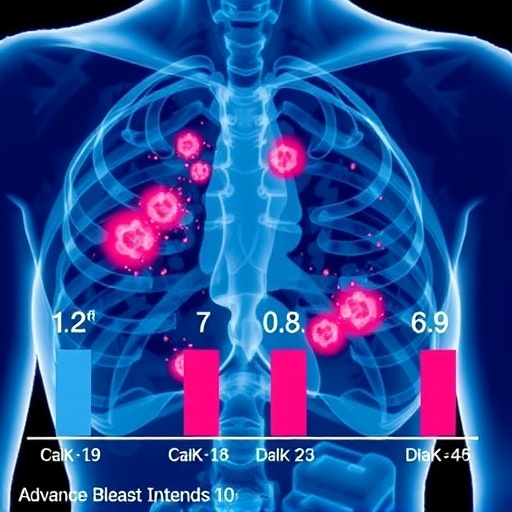In the relentless pursuit of advancing breast cancer treatment, a new landmark study has illuminated the relative strengths and safety profiles of cyclin-dependent kinase 4/6 inhibitors (CDK4/6i) combined with endocrine therapy (ET) in patients with advanced or metastatic hormone receptor-positive (HR+)/human epidermal growth factor receptor 2-negative (HER2-) breast cancer. Published in BMC Cancer (2025), this systematic review and network meta-analysis synthesizes data from over 15,000 patients across 24 clinical trials, providing a nuanced understanding of how these therapies stack up against one another.
Breast cancer remains a formidable global health challenge, particularly in its advanced stages characterized by metastasis. Within this landscape, HR+/HER2- tumors represent a biologically distinct subtype, often treated with endocrine therapies aimed at disrupting hormone-driven tumor growth. However, the emergence of CDK4/6 inhibitors, which target critical drivers of cell cycle progression, has transformed therapeutic strategies by augmenting the effectiveness of ET and extending patient survival.
Employing a Bayesian network meta-analysis framework, the study meticulously compared 12 therapeutic regimens combining various CDK4/6 inhibitors with endocrine agents, focusing on progression-free survival (PFS) as the primary endpoint. The analysis leveraged comprehensive data from four major biomedical databases—Web of Science, PubMed, Cochrane Library, and Embase—ensuring a robust and inclusive literature base.
The integrative statistical approach allowed researchers to evaluate hazard ratios (HR) with 95% confidence intervals (CI), facilitating a direct and indirect comparison of treatments even in the absence of head-to-head trials. Secondary outcomes such as overall survival (OS), objective response rate (ORR), and adverse events (AEs) were also scrutinized to present a holistic therapeutic profile.
Among the CDK4/6 inhibitors evaluated—namely abemaciclib, palbociclib, and ribociclib—significant disparities emerged in progression-free survival. Notably, the combination of abemaciclib and aromatase inhibitors (AI) surfaced as the most efficacious, outperforming palbociclib plus fulvestrant and other regimens by substantial margins, with hazard ratios indicating more than double the benefit in delaying disease progression.
Ribociclib plus AI was identified as the second most effective combination, demonstrating significant superiority over ribociclib plus fulvestrant and abemaciclib plus fulvestrant. These findings underscore the importance of therapeutic pairing specificity, revealing that the endocrine partner selected to accompany the CDK4/6i profoundly influences treatment outcomes.
The Surface Under the Cumulative Ranking (SUCRA) curves further reinforced the prominence of abemaciclib plus AI and palbociclib plus AI in ranking favorability for both PFS and overall survival. Such rankings provide a valuable clinical decision-making tool, distilling complex comparative efficacy data into digestible, actionable insights.
Importantly, despite these differences in efficacy, the safety profiles across the various CDK4/6i and ET combinations were broadly comparable. The study found no statistically significant variations in adverse events, suggesting that enhanced efficacy with certain regimens does not necessarily come at the cost of increased toxicity. This insight is crucial for balancing treatment benefits with patient quality of life.
The implications of these findings are profound for oncologists tailoring therapies to advanced HR+/HER2- breast cancer patients. By identifying abemaciclib plus aromatase inhibitors as a potentially preferred regimen, this research offers a data-driven guidepost in an arena often governed by empirical choices and heterogeneous clinical experiences.
Moreover, the study highlights the necessity for personalized medicine approaches. Given the heterogeneity of breast cancer biology and patient comorbidities, decisions surrounding CDK4/6i plus ET combinations should integrate comprehensive patient assessments alongside robust evidence from such meta-analyses.
From a methodological standpoint, the use of a network meta-analysis facilitates a more interconnected understanding of treatment landscapes, particularly in oncology where direct comparative trials may be sparse or ethically challenging to conduct. This analytic paradigm provides a powerful lens through which to appraise multi-arm clinical data simultaneously.
As new CDK4/6 inhibitors and endocrine agents continue to emerge, the groundwork laid by this comprehensive analysis underscores the need for continual, systematic assessments to update clinical guidelines and optimize patient outcomes.
In conclusion, the study sheds critical light on the comparative utility of CDK4/6 inhibitors combined with endocrine therapy in the management of advanced or metastatic HR+/HER2- breast cancer. Its findings propel the field forward, offering evidence-based clarity on optimal regimens, reaffirming the synergy of cell cycle inhibition and hormone therapy, and underscoring the centrality of personalized treatment strategies in oncology’s evolving landscape.
As the battle against breast cancer presses on, such rigorous, data-driven insights provide indispensable tools in the quest to extend survival, improve quality of life, and ultimately transform the therapeutic horizon for patients worldwide.
Subject of Research: Comparative efficacy and safety of CDK4/6 inhibitors combined with endocrine therapy in HR+/HER2- advanced or metastatic breast cancer patients.
Article Title: Comparative efficacy and safety of CDK4/6 inhibitors combined with endocrine therapy in HR+/HER2- patients with advanced or metastatic breast cancer: a systematic review and network meta-analysis.
Article References:
Liu, Y., Ren, T., Chen, X. et al. Comparative efficacy and safety of CDK4/6 inhibitors combined with endocrine therapy in HR+/HER2- patients with advanced or metastatic breast cancer: a systematic review and network meta-analysis. BMC Cancer 25, 1535 (2025). https://doi.org/10.1186/s12885-025-14841-2
Image Credits: Scienmag.com
DOI: https://doi.org/10.1186/s12885-025-14841-2
Tags: advanced hormone receptor-positive breast cancerBayesian network meta-analysis in oncologyCDK4/6 inhibitors in breast cancer treatmentclinical trials on breast cancer therapiesdata analysis in cancer researchendocrine therapy and CDK4/6i combinationmetastatic HER2-negative breast cancerprogression-free survival in cancer therapysafety profiles of cancer treatmentssystematic review of cancer therapiestargeted therapies for advanced breast cancertherapeutic regimens for metastatic breast cancer





